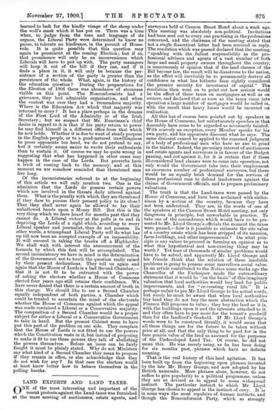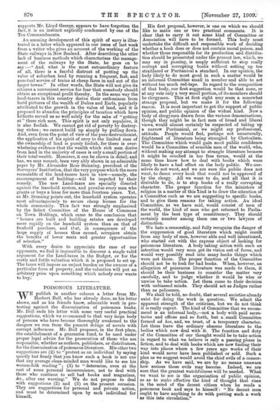LAND EXPERTS AND LAND TAXES.
( NE of the most interesting and important of the kl recent protests Land-taxes was furnished at the mass meeting of auctioneers, estate agents, and surveyors held at Cannon Street Hotel about a week ago. This meeting was absolutely non-political. Invitations had been sent out to every one practising in the professions concerned, and the chairman of the meeting stated that not a single dissentient letter had been received in reply. The resolution which was passed declared that the meeting, "speaking with the fullest responsibility as the pro- fessional advisers and agents of a. vast number of both large and small property owners throughout the country, is unanimously of opinion that if the land clauses of the Bill become law, the result will be disastrous to the nation, as the effect will inevitably be to permanently destroy all confidence in what has hitherto been rightly considered. the premier security for investment of capital." The resolution then went on to point out how serious would be the effect of these taxes on mortgagees as well as on owners, and declared that as soon as the taxes came into operation a large number of mortgages would be called in with the result that heavy losses would be incurred on realisation.
All this has of course been pointed out by speakers in the House of Commons, but unfortunately speeches in that Assembly have come to be regarded as necessarily tainted. With scarcely an exception, every Member speaks for his own party, and his opponents discount what he says. The same discount cannot be applied to the reasoned judgment of a body of professional men who have no axe to grind in the matter. Indeed, the pecuniary interest of auctioneers and estate agents and surveyors is in favour of the Budget passing, and not against it, for it is certain that if these ill-considered land clauses were to come into operation, not only would. the Government take into their employment an enormous number of professional surveyors, but there would be an equally brisk demand for the services of these professional men to defend landowners against the claims of Government officials, and to prepare preliminary valuations.
The truth is that the Land-taxes were passed by the House of Commons, and have been acclaimed with enthu- siasm by a section of the country, because they have not been understood. They are, in the words of one of the speakers at the Cannon Street Hotel meeting, not only dangerous in principle, but unworkable in practice. To take one of the conundrums which would have to be pre- sented to Mr. Lloyd George's officials the moment the taxes were passed,—how is it possible to estimate the site value of a country estate which has been stripped of its mansion, farm-buildings, and other improvements ? On what prin- ciple is any valuer to proceed in forming an opinion as to what this hypothetical and non-existing thing may be worth ? Yet tens of thousands of similar problems would have to be solved, and apparently Mr. Lloyd George and his friends think that the solution of these insoluble problems is going to possess some marvellous social value. In an article contributed to the Nation some weeks ago the Chancellor of the Exchequer made the extraordinary statement that it would be "on the basis" of this imaginary valuation that local authorities would buy land for public improvements, and for " re-creating rural life." It is perhaps unfair to pin Mr. Lloyd George to his actual words, but surely he must be aware that when local authorities buy land they do not buy the mere abstraction which the Finance Bill proposes to value ; they buy the land as it is, with the buildings upon it and the interests attached to it, and they often have to pay more for the tenant's goodwill than for the landlord's freehold. If Mr. Lloyd George's words were to be construed literally, it would mean that all these things are for the future to be taken without price at all, and that the only thing to be paid for is the bare prairie value of the land as assessed for the purposes of the Undeveloped Land Tax. Of course, he did not mean this. He was merely using, as he has been doing for six months past, phrases which have no definite meaning.
That is the real history of this land agitation. It has been built up from the beginning upon phrases invented by the late Mr. Henry George, and now adopted by his British namesake. Mere phrases alone, however, do not suffice to give popularity to a political programme, unless they are so devised as to appeal to some widespread instinct. The particular instinct to which Mr. Lloyd George has chosen to appeal is the instinct of envy. It is in some ways the most repulsive of human instincts, and though the Nonconformist Party, which so strongly supports Mr. Lloyd George, appears to have forgotten the fact, it is an instinct explicitly condemned by one of the Ten Commandments.
An amusing development of this spirit of envy is illus- trated in a letter which appeared in our issue of last week from a writer who gives an account of the working of the State railways in New Zealand. After describing the utter lack•of business methods which characterises the manage- ment of the railways by the State, he goes on to say :—" And, what is the most extraordinary feature of all, there is a fearful distrust of putting up the value of suburban land by running a frequent, fast, and punctual service of trains at cheap fares in and out of the larger towns." In other words, the State will not give its citizens a convenient service for fear that somebody should obtain an exceptional profit thereby. In the same way the land-taxers in this country derive their enthusiasm from lurid pictures of the wealth of Dukes and Earls, popularly attributed to the growth in the value of land, and it is proposed to abandon the principles of taxation which have hitherto served us so well solely for the sake of " getting at" these rich men. This spirit is not only repulsive, it is also foolish. We cannot get rid of poverty by destroy- ing riches ; we cannot build up simply by pulling down. And, even from the point of view of the pure destructionist, the application of his spirit of envy to the limited case of the ownership.of land is purely foolish, for there is over- whelming evidence that the wealth which rich men derive from land in the majority of cases is only a small portion of their total wealth. Moreover, it can be shown in detail, and has, we may remark, been very ably shown in an admirable paper by Mr. Alexander Rose Stenning, president of the Surveyors' Institution, that the very purpose which the more reasonable of the land-taxers have in view—namely, the encouragement of building—will be impeded by their remedy. The new Land-taxes are specially directed against the leasehold system, and penalise every man who grants or buys a lease for more than fourteen years. Yet, as Mr. Stenning points out, the leasehold system operates most advantageously to secure cheap houses for the whole community. This fact was strongly emphasised by the Select Committee of the House of Commons on Town Holdings, which came to the conclusion that " houses are built and building estates are developed more rapidly on the leasehold system than on that of freehold purchase, and that, in consequence of the large supply of houses thus caused, occupiers obtain the benefits of lower rents and greater opportunities of selection."
With every desire to appreciate the case of our opponents, we find it impossible to discover a single valid argument for the Land-taxes in the Budget, or for the costly and futile valuation which it is proposed to set up. The taxes will impose an unjust burden on the owners of a particular form of property, and the valuation will put an arbitrary price upon something which nobody ever wants to buy:















































 Previous page
Previous page